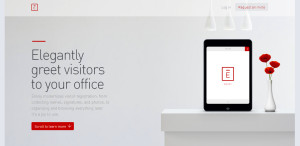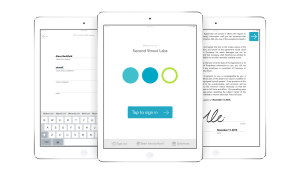Envoy: disrupting the visitor registration sysem
A San Francisco based start-up, Envoy, is transforming how visitors are received and welcomed at an office’s reception desk.
Envoy is a San Francisco based Software as a Service (SaaS) start-up which has found and captured a business opportunity in the seemingly dull and repetitive visitor registration process. Its customizable iPad app, which can be subscribed with $99, $249, or $499 per month payment, replaces a pen and an entryway sign -in book at a firm’s reception desk and digitalize the visitor registration processes including collecting and managing a visitor’s information, signing waivers or nondisclosure agreements, printing visitor badge, sending email notification, etc. When one thinks about things that need to be disrupted, the entryway sign-in book is probably last thing on one’s mind. Envoy, however, has carried out such disruption quite successfully; it now has around 1,000 highly satisfied customers and secured investment from several leading venture capitals such as Andreessen Horowitz.
-in book at a firm’s reception desk and digitalize the visitor registration processes including collecting and managing a visitor’s information, signing waivers or nondisclosure agreements, printing visitor badge, sending email notification, etc. When one thinks about things that need to be disrupted, the entryway sign-in book is probably last thing on one’s mind. Envoy, however, has carried out such disruption quite successfully; it now has around 1,000 highly satisfied customers and secured investment from several leading venture capitals such as Andreessen Horowitz.
Envoy is addressing a very specific and niche need and its scale of business might be still too small to be called as an industry transformer. I, however, think it is certainly a leader in digital innovation; by applying consumer-centric view and technology, it not only has made the existing visitor check-in process more delightful and effective but also has strong potential to digitalize an entire work place.
Similar to other digital technology leaders which are disrupting many industries and companies, Envoy prioritizes consumer’s satisfaction and offers a design-savvy, intuitive, streamlined interface. Thanks to its superior product quality, the application has quickly become a staple in offices and the growth is largely relied on word of mouth. People use Envoy to sign in when they are visiting an office and then they go back to their own office and install Envoy to their front desks. Such easy to use, beautiful user interface helped Envoy to acquire leading technology companies and startups such as Airbnb, Box, and GoPro, and to minimize the customer churn rate.
In ad dition to its well-designed product, Envoy leverages the power of technology to make its service very personalized and customizable. For instance, with its iPhone and Apple Watch apps, it notify employees when a visitor arrives. The push notification setting can be customized per each user’s own preference and synch with one’s email, SMS, or other work communication tools such as Slack. Moreover, it gives a user full flexibility over the documents his visitors sign and offers a service to design a custom badges. Such ability to provide customized service has led its customers to consider Envoy as a personal concierge, increasing customers’ willingness to pay.
dition to its well-designed product, Envoy leverages the power of technology to make its service very personalized and customizable. For instance, with its iPhone and Apple Watch apps, it notify employees when a visitor arrives. The push notification setting can be customized per each user’s own preference and synch with one’s email, SMS, or other work communication tools such as Slack. Moreover, it gives a user full flexibility over the documents his visitors sign and offers a service to design a custom badges. Such ability to provide customized service has led its customers to consider Envoy as a personal concierge, increasing customers’ willingness to pay.
Lastly, because its business model is based on software licensing and delivery and its core competencies are design and engineering capabilities, its business is very scalable and can be easily transformed or expanded for potential opportunities. For instance, leveraging the current check-in and information management product, it can offer services on organizing conference room bookings, alert for package arrivals, or a replacement for ID card/badges. Moreover, its service can be adopted to places other than offices such as gym, yoga studio, schools or other public facilities that require check-ins. The more information on users it accumulates, the more attractive its service becomes as a human resource management or a marketing tool. Such flexibility in the business model and core competencies makes the firm more attractive and its prospect more optimistic.
Indeed, there exist some concerns on the company’s future. As of now, there is no direct competitor against Envoy. Since it has proved that the business facilitating a firm’s visitor registration process is profitable and there is no significantly high entry barrier yet, more companies will look for opportunities in the same market. Moreover, recognizing the value of the effective visitor registration process, more companies will consider an option of building in-house reception desk software. Despite such challenges, I think, if it can successfully create an ecosystem around its core services, it has sufficient resources and talents to optimize and transform our office experiences.



Hmmm… interesting idea. A few concerns though: is their proprietary software actually better than someone else could build? I don’t mean AirBnB would build this themselves, but is the market defensible against other software companies? It seems like a simple idea at this point that others could replicated and sell at a lower price point. Unless the user interface is actually that much better, or if they’ve already signed up a large enough customer base… I also wonder what businesses would never sign up for this. Would a doctor’s office? Would a therapist’s office? Would If a computer greets you at the door, does it change the experience of entering a business, or will everyone eventually prefer a robot or iPad to ease their check in and send them in the right direction? Given the growth of fully automated businesses (even for food preparation! see: https://www.eatsa.com/), maybe that is the direction we’re going… Finally, I’m assuming this model would still require a security guard, and maybe someone on call to repair the interface when it glitches, so I wonder what the actual cost savings are. But you’re right, the added convenience of automatic alerts and the potential to make deliveries easier would be huge value adds!